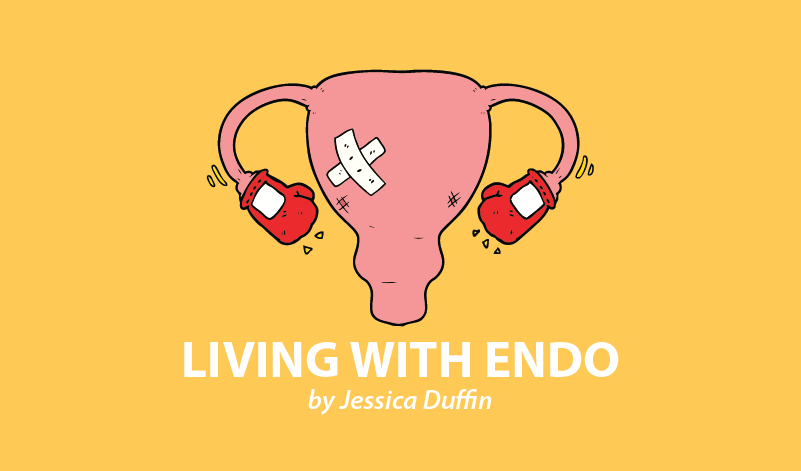Endometriosis-induced burnout can creep in when you’re trying your hardest to manage life and endometriosis to the best of your ability, but there are ways to prevent it. Recently, we addressed friends and family. Here, we discuss other impacts.
Work
Of course, work is listed as being one of the main causes of burnout and it’s also where you can see a big impact.
If you haven’t done this already, it’s worth talking to your manager or HR office about your condition. Let them know what you’re facing, whether it’s endometriosis, depression, anxiety, the beginnings of burnout, or all of the above. They should be able to offer you reasonable adjustments.
In some cases, they may send you to an occupational therapist, who should be neutral and will assess your condition and then make suggestions about what can help. In other cases, you may need to suggest what could help, and it’s worth having thought about this before you ask. Would a day a week working from home help? Could you ask for a day off a week to help, temporarily? Even if you take a pay cut or maybe work longer hours on the other four days, it might help.
In addition to this, look at your workload. Is it realistic? Can you talk to your manager about shifting the weight slightly while you look after your health? Can you delegate more?
And, finally, is this the right role for you? Is it better to leave now, take a break or go start something new, before you burn out entirely? Or does the idea of even going for an interview make you want to hide under your duvet.
Make room for joy
When you’re living with a chronic disease, life can become very, very serious. All of those doctors’ appointments, trips to the hospital, eating right, taking medication, dosing up on supplements, etc. Even the activities that should bring lightness, such as exercise or meditation, can feel like a chore or another thing on the to-do list just to feel well.
In the past few years, I’d become so obsessed with getting well and looking after myself, I’d forgotten to have fun. Of course, depression played a major role in this, as did exhaustion, but I didn’t even allow myself time to watch Netflix once in a while.
This lack of fun sucks the joy out of life, and everything begins to look gray and is hard work. This feeling exaggerates the onset of burnout and also is a symptom of burnout, so try to add in some fun before it becomes a bad cycle.
Laughter actually helps pain relief, so whether you’re chatting with friends (even if you have to do it from underneath your duvet) or watching stand-up comedy, you’re actually helping to improve your condition without even trying!
Prioritize your health
We all know that when we’re feeling low is when we’re most vulnerable to illness. Women with endometriosis often have weaker immune systems, and those suffering from burnout often get ill easily as well.
It’s much easier to spiral when you’re feeling mentally exhausted and physically exhausted, so one of the most important things we can do to prevent endometriosis-induced burnout, is to look after our basic health.
I’m not talking about spending hundreds on super foods, I’m talking about sleep, rest, hydration, nutrients and exercise. Unfortunately, we regard these things as optional and luxuries, but they are most definitely essential and what keeps our bodies alive and capable.
Get real with yourself
Living with endometriosis is tough. Really tough. But is there more to your burnout than just endometriosis? Sometimes in situations where you’ve gotten this low, this burned out, it’s time to look at your life and see the paths that have led you down this road.
For me, I had to get very real with myself. I couldn’t continue to blame everything on endo. I had to finally realize just how damaging my workaholism and perfectionism were, and how unrealistic and unsustainable it was to continue like that. I also had to dig deep inside, and seek the support of professionals to discover why these traits were so strong in me, and how I could break these behavioral patterns to make them more manageable to live with.
In addition to this, I’ve also begun trying to build new patterns. I am looking at my values and beliefs, and making sure I am creating a lifestyle that stems from my core beliefs and values, so that I can feel content with my day-to-day existence, rather than experiencing constant resistance.
This January, take some time to look at your life and see what you could change this year, to make life with endometriosis and burnout happier, more content and more aligned to you.
***
Note: Endometriosis News is strictly a news and information website about the disease. It does not provide medical advice, diagnosis, or treatment. This content is not intended to be a substitute for professional medical advice, diagnosis, or treatment. Always seek the advice of your physician or other qualified health provider with any questions you may have regarding a medical condition. Never disregard professional medical advice or delay in seeking it because of something you have read on this website. The opinions expressed in this column are not those of Endometriosis News or its parent company, BioNews Services, and are intended to spark discussion about issues pertaining to endometriosis.


